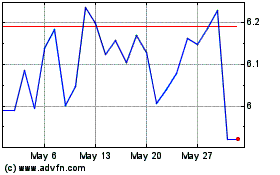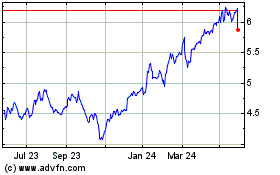By Matthew Dalton, Eric Sylvers and William Boston
Fiat Chrysler Automobiles NV is stopping almost all production
in Europe for the next two weeks and Volkswagen AG has shut
factories in Italy and Spain, as global manufacturers try to
protect workers from the spread of the new coronavirus outbreak and
as supply lines start to break down.
Meanwhile, some of Italy's biggest companies -- suddenly on the
front lines of the outbreak -- are rethinking their assembly lines
and other manufacturing processes to stay open. Similar
re-evaluations are just now getting under way in the U.S., as the
outbreak spreads rapidly there now, too.
EssilorLuxottica SA, the French-Italian designer-eyewear
manufacturer of brands such as Ray-Ban and Oakley, said over the
weekend it is shutting its factories in northern Italy for several
days to implement new worker-protection measures negotiated with
labor unions. The company will be largely adopting Italian
government guidelines aimed at minimizing staff and spacing workers
at greater distances from one another in manufacturing sites and
along assembly lines.
Factory employees will also have to wear masks and get their
temperatures taken when entering the factory, among other measures,
the company said.
In the U.S., executives and industry analysts are also now
starting to think about how to adjust production schedules and
experiment with changes. In Chattanooga, Tenn., Volkswagen AG is
closing down its factory on Monday to allow workers to make
arrangements amid closed schools.
"We will also take time to augment the already increased
sanitary and deep-cleaning measures undertaken at our facility," a
spokesman said. Production will resume Tuesday.
Fiat Chrysler last week said it would also space out employees
at workstations at its Italian plants, a move that it said would
lower daily production rates. Monday morning, it took the more
drastic step of closing down almost all manufacturing in Europe for
two weeks.
The car maker said it would close six Italian factories that
assemble Fiat, Jeep, Maserati and Alfa Romeo branded vehicles. The
company is also shutting down a factory in Poland and one in Serbia
that make Fiats. The company, which has about 65,000 employees in
Europe, didn't say how many workers would be staying home due to
the closures.
Like all companies in Italy, and in many other parts of Europe,
Fiat Chrysler has most of its office-based employees already
working from home. The factory workers forced to miss work due to
the closings will get most of their salary through a largely
government-funded scheme for companies in difficulty.
Fiat Chrysler last month temporarily halted production in its
Serbian factory because it couldn't get parts from China. The
factory closings announced Monday aren't linked to an inability to
get parts, according to a person familiar with the situation. It is
keeping open some smaller factories in Italy that make motors and
other parts because in those plants it is easier to make
adjustments to respect the minimum-distance requirement.
The factories being closed include one in the south making the
Jeep Renegade that are exported to North America. Fiat Chrysler
imported a total of 98,429 vehicles from Italy to the U.S. in 2019,
according to the International Trade Administration.
Ferrari NV and Lamborghini, the luxury-car maker owned by
Volkswagen, both closed their own factories in Italy over the
weekend. Ferrari said it was experiencing supply line issues, while
Lamborghini's chief executive said in a statement that shuttering
his plant was "an act of social responsibility."
Volkswagen, the world's biggest auto maker by sales, said Monday
that it is becoming difficult to maintain production in its
European factories because of disruptions to suppliers and national
governments declaring emergencies. It said, however, that as the
situation darkens in Europe, its production base is improving in
China, where 31 of its 33 factories are now back online after weeks
of being closed as the coronavirus pandemic gripped that
country.
"While the situation in China is stabilizing, it is becoming
more difficult in Europe," said Jörn Roggenbuck, a Volkswagen
spokesman. "It is becoming more complicated to maintain supply
chains."
Volkswagen's Lamborghini and Bugatti plants in Italy have halted
production. In the wake of the Spanish government's declaration of
a state of emergency Volkswagen factories in Martorell and Navarra
have shut down. The plants produce vehicles for SEAT and other
Volkswagen passenger car brands.
As the coronavirus spread takes hold in the U.S., executives and
analysts are considering changes, there, too. Retooling assembly
lines drastically, though, is especially tough for the U.S. auto
industry, where there is very little redundant capacity, said Brian
Collie, director of automotive practice at Boston Consulting
Group.
"Most vehicle manufacturers tend to manufacture a given model
line on one line. Most suppliers for a given vehicle program tend
to manufacture that out of one facility," he said, adding: "So the
question is what happens at that plant if somebody then gets the
coronavirus? How do you then work through that?"
He says some manufacturers are limiting the number of visitors
to sites, including suppliers. Paul Sura, vice president of
business operations at Cypress Semiconductor Corp., which supplies
electronic components to the industry, said the company is
restricting factory visits.
"We're basically turning away any visitors. If customers want to
come and audit us, which is a normal thing on a weekly basis, none
of that is happening," he said. "It's all postponed at least two to
three months. We're just not letting anybody in unless you have to
be there to keep that factory going."
Write to Matthew Dalton at Matthew.Dalton@wsj.com, Eric Sylvers
at eric.sylvers@wsj.com and William Boston at
william.boston@wsj.com
(END) Dow Jones Newswires
March 16, 2020 05:58 ET (09:58 GMT)
Copyright (c) 2020 Dow Jones & Company, Inc.
Pirelli & C (BIT:PIRC)
Historical Stock Chart
From Nov 2024 to Dec 2024

Pirelli & C (BIT:PIRC)
Historical Stock Chart
From Dec 2023 to Dec 2024
